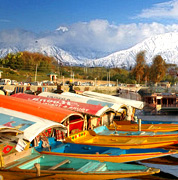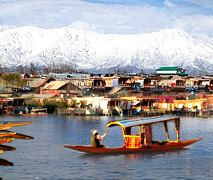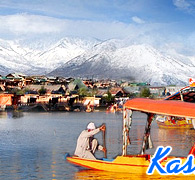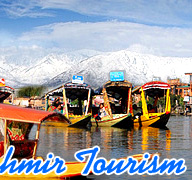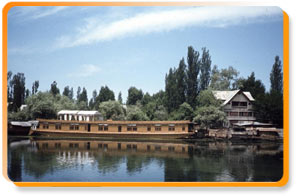 Dal Lake has rightfully become an icon of the Kashmir
tourism industry. A Himalayan urban lake, it has five basins and a
number of channels that are well linked with each other. There are
plenty of fishes in Dal Lake and fishery is the second largest industry
of the region centered on the lake. The sparkling quiet waters of Dal
surrounded by snow-capped mountains on its three sides, undoubtedly mark
it as one of the most beautiful lakes of India. It is also the second
largest lake in the State of Jammu and Kashmir with numerous gardens and
orchards all along its shores. Houseboats form an indelible part of the
scenery of the Dal Lake that are always ready to take tourists to a
romantic and peaceful ride of the lake and soothe their nerves as the
houseboat floats over the slightly rippling waters. They also offer some
of the most exotic views of the splendid scenery of the Dal Lake.
Dal Lake has rightfully become an icon of the Kashmir
tourism industry. A Himalayan urban lake, it has five basins and a
number of channels that are well linked with each other. There are
plenty of fishes in Dal Lake and fishery is the second largest industry
of the region centered on the lake. The sparkling quiet waters of Dal
surrounded by snow-capped mountains on its three sides, undoubtedly mark
it as one of the most beautiful lakes of India. It is also the second
largest lake in the State of Jammu and Kashmir with numerous gardens and
orchards all along its shores. Houseboats form an indelible part of the
scenery of the Dal Lake that are always ready to take tourists to a
romantic and peaceful ride of the lake and soothe their nerves as the
houseboat floats over the slightly rippling waters. They also offer some
of the most exotic views of the splendid scenery of the Dal Lake. There are Shikaras that look like small ornate versions of the gondolas of Venice that offers ferry rides to and from the banks of the lake to the houseboats. The shores of the Lake houses the distinct Moghul monuments and the campus of the Kashmir University while the two hillocks overlooking the lake house Shankaracharya and Hari Parbat temples. The glorious Mughal gardens on its shores contribute to the beauty of the Dal Lake. Out of about five hundred gardens laid down in 16th to 17th century, only a few still survive. There have been controversies about the origin of the Dal Lake. While some geologists believe that the origins of Dal Lake lie in the Pleistocene Oligotrophic Lake that once covered the entire valley of Kashmir, others just believe it to be a flood plain lake. The floating gardens of Dal Lake are considered a beauty in themselves. One can find a number of restaurants and hotels at the lakefront that have sprung up, encouraged by the large influx of tourists here.




